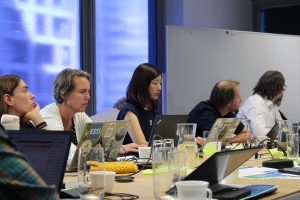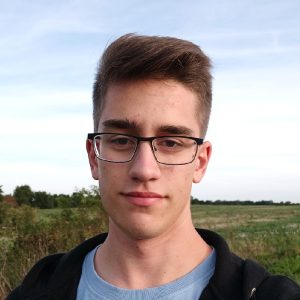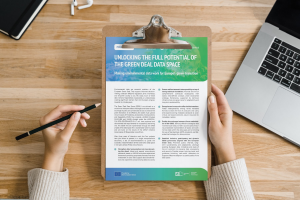On the 29th and 30th June 2023, the second plenary meeting of AD4GD took place in the German city of Leipzig. The 12 members of the project consortium spent two intense days discussing face-to-face the progress made during this first year of shared efforts. In addition, the roadmap for further work in the coming months was established. The meeting conveniently took place during the last days of Data Week 2023, an event that brought together enthusiasts of data, digitalisation, artificial intelligence and urban development challenges and where several members of the project presented their latest developments.
Joan Masó, coordinator of the project and researcher at CREAF, opened the session by welcoming all those present and situating the project in its timeframe. He also introduced Andreas Matheus, expert on data privacy and privacy-by-design, as our external advisor during the sessions. The AD4GD project has been running for almost a year now and the first actions have been executed according to the established timelines. In that regard, the first deliverables have already been published. The next steps of the project look ahead to February 2024, the 18th month of the project, when a first assesment of our progress will be carried out by the European Comission.

Joan Masó reported on the collaboration with the so called sister projects( FAIRiCUBE, USAGE, and B3) and the efforts done in the GDDS Action group in EuroGEO context. He also exposed our project plans for attending the Bolzano EuroGEO event organized by the European Commission and the OEMC project.
Searching for the data space
One of the central discussions of the assembly was the nature of the European Green Deal Data Space and how we can contribute to its implementation. Joan Masó laid the groundwork for the discussion and the value of a multi-faceted view based on specific pilot cases was highlighted in a context of co-creation by different actors. Nevertheless, our focus will be set on two essential components: FAIR data and protected data.
Another pillar of the project is interoperability. That is why special attention was paid to the common data sharing models explained by Raul Palma from PSNC. In this sense, Carlos Cob and Joaquin García from ATOS-ARI, who are using artificial intelligence and machine learning to ensure the quality, security and exploitability of the data, also presented their progress. In addition they are investigating, together with Cèdric Crettaz from IoTLab, how to converge high-performance computing, cloud data and artificial intelligence resources. Cèdric also updated the status of the WP3, which is devoted to the integration of heterogeneous data coming from devices based on Internet of Things.

The state of integration of In-situ networks, citizen science data and Socioeconomic Data was presented by Victoria Lush from Aston University and Joan Masó. Additionally, Ekaterina Kasyanova-Kühl from ECCP showcased the Data Management Plan and invited everyone to collaborate sharing their needs and requirements.
The core of the project: the pilot cases
Due to the central relevance of the pilot cases in the AD4GD project, a vast part of the time was devoted to updating their status. Their main objective is to test that data integration can improved accessibility to information and as a consequence enhance decision making. In the context of the European Green Deal Data Space, Our focus is set on three of its key objectives: climate change, zero pollution and biodiversity.

During these first months the foundations have been laid and the work will start as such from october 2023, as exposed by Lucy Bastin from Aston University, WP6 leader. Malte Zamzow from KWB took the floor as the leader of the pilot project focusing on zero pollution, which will focus on the small lakes in the city of Berlin as a case study. He was followed by Ivette Serral from CREAF, who presented their approach for the biodiversity pilot case, which will focus on biodiversity corridors in Barcelona. Finally, Ulrike Falk and Tom Hodson from ECMWF also spoke on the climate change pilot case that will be working with air quality data in the city of Milan.
An outward look
Florian Jasche and Lena Brüch from Fraunhofer FIT showed their progress on their study on the requirements coming from the end-users. A stakeholder analysis has been carried out, as well as a series of interviews with the different pilot partners. In addition, a user journey perspective is being implemented to define scenarios and identify gaps. Florian and Lena also reviewed the evolution of the user-friendly and intuitive interface design they are working on. To help in this task, different activities will be organized, such as a design sprint and several workshops.

Finally, Sebastien Ziegler from MI followed up WP7 on communication strategy, standardization and outreach. He highlighted the work done on social media and the series of interviews to the different partners that are being published on our Youtube channel. He then gave way to Katalin Szilagyi and Zsuzsanna, from Design Terminal, who led us through an Exploitation Workshop to search for possible products derived from the work done at AD4GD.
The best dressing: a data festival
A project meeting is more productive if the surrounding environment is also innovative. That’s why we didn’t miss the opportunity to share experiences and listen to other success stories at the Data Week Leipzig 2023. Several of the researchers involved in the AD4GD project presented some of their progress and we commented on it on our Twitter profile. You can read the chronicle of our presence at Data Week below:





